Parliament of Ghana facts for kids
Quick facts for kids Parliament of Ghana |
|
|---|---|
| 9th Parliament of the 4th Republic | |
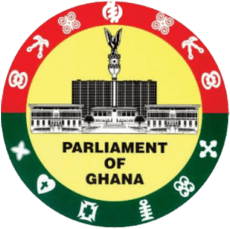 |
|
| Type | |
| Type | |
| Leadership | |
|
Speaker
|
Alban Bagbin (NDC)
|
|
First Deputy Speaker
|
Bernard Ahiafor (NDC)
|
|
Second Deputy Speaker
|
Andrew Asiamah Amoako (NPP)
|
|
Majority Leader
|
Mahama Ayariga (NDC)
|
|
Minority Leader
|
Alexander Afenyo-Markin (NPP)
|
| Structure | |
| Seats | 276 |
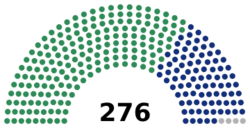 |
|
|
Political groups
|
Majority (184)
Minority (92)
|
| Elections | |
| First-past-the-post | |
|
Last election
|
7 December 2024 |
|
Next election
|
7 December 2028 |
| Meeting place | |
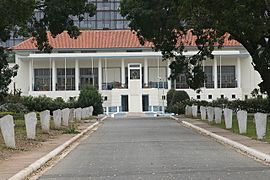 |
|
| Parliament House Accra, Greater Accra Republic of Ghana |
|
The Parliament of Ghana is the main law-making body of Ghana. It has 276 members. These members are chosen by the people in elections every four years. Each member represents a specific area, called a constituency. They are elected using a system where the person with the most votes wins.
Contents
The Story of Ghana's Parliament
Early Days as a Colony
Ghana's journey to having a parliament began in 1850. At that time, Ghana was a British colony known as the Gold Coast. The first legislative body was called the Legislative Council. It only gave advice to the Governor, who held all the power to make laws.
Changes were made in 1916 and 1925, but the Governor still had a lot of power. In 1946, a new set of rules allowed a non-government member to lead the Legislative Council. The Governor no longer automatically led the council.
Towards Independence
In 1951, Ghana held its first elections where everyone could vote. The Legislature also chose its first leader, called a Speaker, Sir Emmanuel Charles Quist.
The Convention People's Party (CPP), led by Kwame Nkrumah, won the 1951 election. Kwame Nkrumah, who had been held in prison for his political activities, was released. He became the Leader of Government Business and then Ghana's first Prime Minister the next year.
The CPP won more elections in 1954 and 1956. On March 6, 1957, the Gold Coast became independent and was renamed Ghana. The Legislative Assembly was then called the National Assembly.
Ghana as a Republic
Ghana became a republic on July 1, 1960, with Kwame Nkrumah as its President. The National Assembly members' terms were extended. In 1964, Ghana became a one-party state, meaning only the CPP could run in elections.
In 1966, the military took control of the country. They stopped all political parties and closed the National Assembly.
Return to Civilian Rule
Ghana returned to civilian rule in 1969. Elections were held, and the Progress Party (PP), led by Kofi Abrefa Busia, won most of the seats. Kofi Busia became Prime Minister. His government was removed from power by the military in 1972.
During the Third Republic (1979-1981), the People's National Party (PNP) won the elections. Their leader, Hilla Limann, became President. However, after the military took control again in 1981, all elected government bodies were closed, and political parties were not allowed.
The Fourth Republic: Today's Parliament
After 11 years of military rule, a new constitution was approved in 1992. Jerry Rawlings, who had led the military government since 1981, won the presidential elections. Some political groups disagreed with the results and chose not to take part in the parliamentary elections that December. Because of this, Rawlings' National Democratic Congress (NDC) won most of the seats.
In the 1996 elections, all parties participated. The NDC won again, but the main opposition, the New Patriotic Party (NPP), also won many seats.
The 2000 elections were important because President Rawlings could not run for another term. John Kufuor of the NPP won the presidential election. In Parliament, the NPP won the most seats, followed closely by the NDC.
In 2004, President Kufuor was re-elected. The NPP also won more seats in Parliament.
Today, Ghana's parliamentary elections use a simple majority voting system. Since 2012, the country has been divided into 275 areas, each electing one member. Members serve for four years. The current Parliament, the 9th Parliament of the 4th Republic, began its work after the 2024 general election.
Who Leads the Parliament?
The Parliament has several important leaders who help it run smoothly:
- Speaker - The Speaker is like the referee of Parliament. They lead the meetings and make sure everyone follows the rules. After an election, the party with the most seats works with other parties to choose a Speaker. The Speaker cannot be a Member of Parliament but must be qualified to be one. The current Speaker is Alban Bagbin.
- First Deputy Speaker - This person takes charge of Parliament meetings when the Speaker is not there. The current First Deputy Speaker is Hon. Bernard Ahiafor of the NDC.
- Second Deputy Speaker - This person leads Parliament meetings if both the Speaker and the First Deputy Speaker are absent. The current Second Deputy Speaker is Andrew Asiamah Amoako of the NPP.
- Majority Leader - This leader comes from the political party that has the most seats in Parliament. They are helped by a Deputy Majority Leader and a Majority Chief Whip. The current Majority Leader is Mahama Ayariga of the NDC.
- Deputy Majority Leader - This person assists the Majority Leader. The current Deputy Majority Leader is Kweku George Ricketts-Hagan of the NDC.
- Minority Leader - This leader comes from the second-largest political party in Parliament. They are also helped by a Deputy Minority Leader and a Minority Chief Whip. The current Minority Leader is Alexander Afenyo-Markin of the NPP.
- Deputy Minority Leader - This person assists the Minority Leader. The current Deputy Minority Leader is Patricia Appiagyei of the NPP.
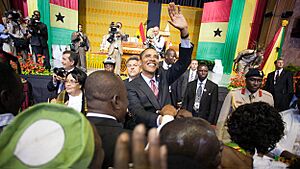
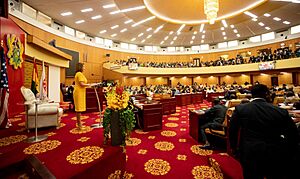
Committees of Parliament
Parliament uses committees to do its work more efficiently. These smaller groups study specific topics in detail. As of November 2020, there were fourteen Standing Committees and sixteen Select Committees. There was also one special ad hoc committee.
| Standing Committees:
Appointments • Business • Committee of Selection • Finance • Gender and Children |
| Select Committees:
Communications • Constitutional, Legal and Parliamentary Affairs • Defence and Interior • Education • Employment, Social Welfare and State Enterprises |
Ad-hoc Committee:
Poverty Reduction Strategy committee
Past Speakers of Ghana's Parliament
The Speaker is a very important role. Here are some of the people who have served as Speaker throughout Ghana's history.
Gold Coast (1951 – 1957)
These were the Speakers when Ghana was still the Gold Coast.
| Name | Took office | Left office | Notes |
|---|---|---|---|
| Emmanuel Charles Quist | March 1951 | December 1957 |
Independent State and First Republic (1957 – 1966)
Speakers during Ghana's early years of independence.
| Name | Took office | Left office | Notes |
|---|---|---|---|
| Augustus Molade Akiwumi | February 1958 | June 1960 | |
| Joseph Richard Asiedu | July 1960 | June 1965 | |
| Kofi Asante Ofori-Atta | 10 June 1965 | 24 February 1966 |
Second Republic (1969 – 1972)
Speaker during the Second Republic.
| Name | Took office | Left office | Notes |
|---|---|---|---|
| Nii Amaa Ollennu | October 1969 | 13 January 1972 |
Third Republic (1979 – 1981)
Speaker during the Third Republic.
| Name | Took office | Left office | Notes |
|---|---|---|---|
| Jacob Hackenbug Griffiths-Randolph | 24 September 1979 | 31 December 1981 |
Fourth Republic (1992 – Present)
Speakers since Ghana returned to democratic rule in 1992.
| Name | Took office | Left office | Notes |
|---|---|---|---|
| Daniel Francis Annan | 7 January 1993 | 6 January 2001 | |
| Peter Ala Adjetey | 7 January 2001 | 6 January 2005 | |
| Ebenezer Sekyi Hughes | 7 January 2005 | 6 January 2009 | |
| Joyce Adeline Bamford-Addo | 7 January 2009 | 6 January 2013 | |
| Edward Adjaho | 7 January 2013 | 6 January 2017 | |
| Aaron Mike Oquaye | 7 January 2017 | 6 January 2021 | |
| Alban Sumani Bagbin | 7 January 2021 | Incumbent |
Members of Parliament
The number of Members of Parliament (MPs) has changed over time. In the Second and Third Republics, there were 140 members. In the current Fourth Republic, the number first grew to 200 and then to 275. Currently, there are 276 members.
- For a list of current members, see List of MPs elected in the 2024 Ghanaian general election.
Here are the different Parliaments of the Fourth Republic:
- 1st parliament: 1993 — 1997
- 2nd parliament: 1997 — 2001
- 3rd parliament: 2001 — 2005
- 4th parliament: 2005 — 2009
- 5th parliament: 2009 — 2013
- 6th parliament: 2013 — 2017
- 7th parliament: 2017 — 2021
- 8th parliament: 2021 — 2025
- 9th parliament: 2025 — present
Parliamentary Constituencies
Ghana is divided into many areas called constituencies. Each constituency elects one person to be a Member of Parliament.
See also
 In Spanish: Parlamento de Ghana para niños
In Spanish: Parlamento de Ghana para niños
- Speaker of the Parliament of Ghana
- Ghana
- History of Ghana
- Legislative Branch
- List of national legislatures
- List of Ghana Parliament constituencies
 | Delilah Pierce |
 | Gordon Parks |
 | Augusta Savage |
 | Charles Ethan Porter |

